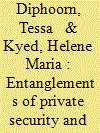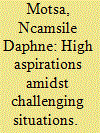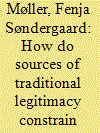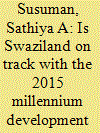|
|
|
Sort Order |
|
|
|
Items / Page
|
|
|
|
|
|
|
| Srl | Item |
| 1 |
ID:
147821


|
|
|
|
|
| Summary/Abstract |
Security in Africa is seldom a public good provided by the state, but is frequently something you pay for or acquire by turning to various non-state or community actors. The privatization of security in African cities is reflected in the rapid growth of the private security industry, which is matched by the widespread involvement of civilian actors in neighbourhood watches and self-organized policing groups. Much of the scholarly debate on ‘plural policing’ and ‘security assemblages’ has focused on what the privatization of security means for the state, highlighting how the public–private divide is increasingly blurred as state police services interact with either private or community security actors. This article adds a novel perspective by exploring the entanglements between private security companies and civilian community policing groups in urban areas of South Africa and Swaziland. Based on ethnographic fieldwork, the article shows how these actors engage with each other in different, often informal, ways and across socio-spatial boundaries. The result is the simultaneous communalization of private security and privatization of community policing. However, these are not straightforward processes. Sets of actors slip in and out of commercial and community logics of security, but also frequently articulate their distinctions as part of positioning themselves in a competitive security landscape, thereby raising questions about the objectives and motivations that drive many security performances.
|
|
|
|
|
|
|
|
|
|
|
|
|
|
|
|
| 2 |
ID:
160823


|
|
|
|
|
| Summary/Abstract |
Informed by social constructionism, this article explores the educational aspirations, fears and support mechanisms required to enhance the schooling experiences of vulnerable children in one rural school in Swaziland. It uses data from semi-structured interviews and photovoice based on a qualitative study of six vulnerable children, aged between 11 and 15 years. Vulnerable children viewed education as a vehicle for their aspired better adult life. These children held anxieties regarding anticipated lack of support to complete further education. Support mechanisms included the need for the community and teachers to assist with basic survival necessities like candles, clothing, and general parental guidance.
|
|
|
|
|
|
|
|
|
|
|
|
|
|
|
|
| 3 |
ID:
165197


|
|
|
|
|
| Summary/Abstract |
Research concerning authoritarian stability and peace usually investigates co-optation and repression. Recently, several studies argue that traditional legitimacy is also important for stability in monarchies. However, existing research rarely considers how legitimacy constrains rebellions and help the royal family to stay in power. Hence, this article explores the causal links between sources of traditional legitimacy and absence of uprisings. The study investigates the relationship with a case study of the Kingdom of Swaziland. In line with my expectations, I find a causal relationship between sources of traditional legitimacy and absence of popular uprisings. First, the royal family actively uses traditional legitimacy to justify their rule. Second, the Afrobarometer indicates that the Swazi people trust the King more than citizens in other African countries trust their head of state. Third, opposition actors have limited opportunities to mobilize the broader population against the monarchy. Fourth, traditional legitimacy dampens ongoing protests and thereby hinders their escalation into popular uprisings or political violence. Repression is clearly an important explanation for limited rebellion in Swaziland, but this article shows that also traditional legitimacy sources play a role
|
|
|
|
|
|
|
|
|
|
|
|
|
|
|
|
| 4 |
ID:
157191


|
|
|
|
|
| Summary/Abstract |
According to the Millennium Development Goals (MDGs) agreement, each participating country has to periodically provide a report that will show the progress on their achievement towards the goals. This article’s aim is to evaluate Swaziland’s prospects of achieving eight MDGs by 2015. This article is an analysis of the current situation of Swaziland, and the aim of this analysis is to look beyond the statistical values to see if the achievements (including lifetime achievements) are on track and whether what is yet to be achieved can really be achieved. Secondary information was collected from various sources. Several countries and organizations have committed themselves to the following eight development goals: (1) eradicate extreme poverty; (2) achieve universal primary education; (3) promote gender equality and empower women; (4) reduce child mortality; (5) improve maternal health; (6) combat HIV/AIDS, malaria and other diseases; (7) ensure environmental sustainability; and (8) develop a global partnership for development. National development is dependent on many factors; therefore, different countries across the world have adopted the MDGs as means of alleviating many of the social ills hindering progress and development. Based on different sources, Swaziland is on track with its MDGs, and there is no doubt that Swaziland will continue to work hard to these ends. It has been argued that there has been progress made that has resulted in significant changes to people’s lives, but the question that has to be asked is how long these achievements can realistically last. A reduction of the rate of child mortality, maternal mortality and HIV/AIDS in Swaziland are needed.
|
|
|
|
|
|
|
|
|
|
|
|
|
|
|
|
| 5 |
ID:
107324


|
|
|
|
|
| Publication |
2011.
|
| Summary/Abstract |
Political violence, at times perceived as terrorism, remains a major security challenge in Swaziland. The common view is that this violence is perpetrated by those who feel marginalised from the political process. Central to the hypothesis advanced in this paper is that any effective solution to the menace of political violence and the security challenges it poses begins with an awareness of the symbiotic relation between security, human rights and democracy. It has been empirically proven that abuse of human rights can lead to violence, which negates peace and security in any society. In terms of content the paper looks at the shape of political violence in Swaziland. Next, it discusses the strategies and ideas behind efforts by the Swazi state to combat political violence and the counter-arguments. The final section shows the inextricable link between security, human rights and democracy; and argues that recognising this linkage can provide the key to unlocking the security puzzle in Swaziland.
|
|
|
|
|
|
|
|
|
|
|
|
|
|
|
|
| 6 |
ID:
088919


|
|
|
|
|
| Publication |
s.l., Govt. of Netherlands, Norway, Sweden, Switzerland, 1999.
|
| Description |
59p.
|
| Series |
ISS monograph series no.35
|
|
|
|
|
|
|
|
|
|
|
|
Copies: C:1/I:0,R:0,Q:0
Circulation
| Accession# | Call# | Current Location | Status | Policy | Location |
| 041504 | 355.82096/NKI 041504 | Main | On Shelf | General | |
|
|
|
|
|
|
|
|
|